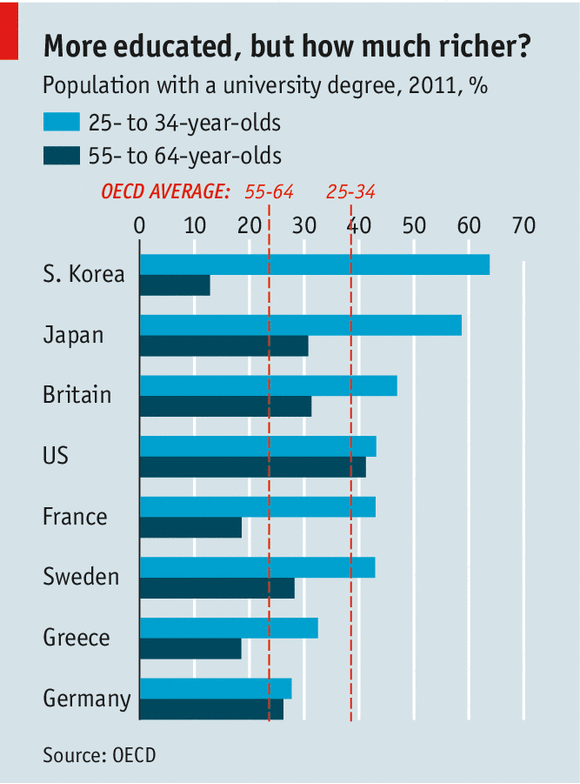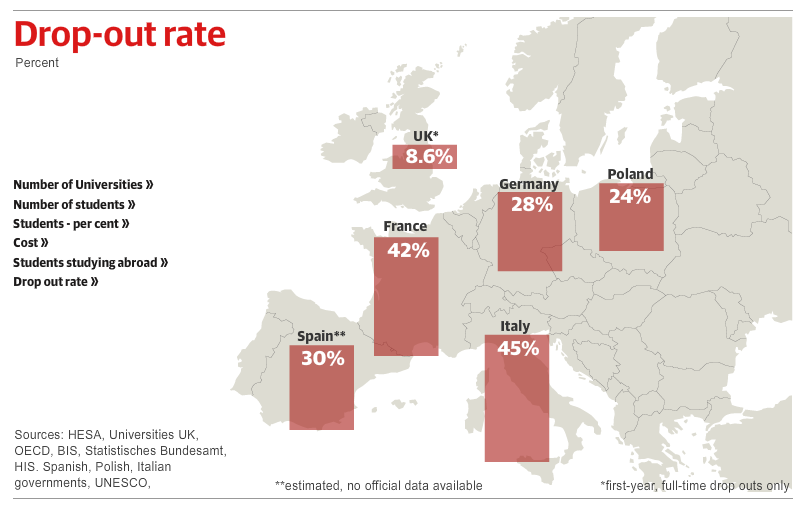Youth unemployment in France: une grande préoccupation
 Being a French university student isn’t exactly a walk in the park.
Being a French university student isn’t exactly a walk in the park.
Sure, you get to have your croissant and chocolat chaud every morning, reading Voltaire or Rousseau while everyone else hurries to work. But there is also the knowledge that you must savour these pleasures because they are sure to end. Then you’ll be left, like many of your generation, with two degrees – including a Masters qualification – yet struggling to find a job in France.
With universities open to all bacheliers (students who pass their baccalauréat), the youth unemployment rate cannot be simply blamed on lack of access to education. Nor can socio-economic disadvantages be solely responsible, with the government helping new job seekers with grants, benefits and housing support.
So why are the French youth struggling so much to manage in the big wide world?
 Hollande, the President of Change
Hollande, the President of Change
Hollande won a whirlwind election in 2012, only the second Socialist president during the Fifth French Republic. His shoulders needed to be broad to bear France’s troubles and it turns out that they are not quite broad enough. Scandals, controversial bills and his failed efforts to get France’s economy back on track have lost him the support of the people.
Youth unemployment in France has become systemic. In fact, in the last thirty odd years from 1983 to April this year, the average youth unemployment rate has been at 20.7%. Despite the fact that François Hollande was prophesied to be the economic push that France needed, he has sorely disappointed some of his greatest supporters.
A new high in the French unemployment rate in February was a blow to Hollande’s government and saw much of the French public turning their backs on their leader. During his presidency, the youth unemployment rate has in fact decreased – the problem is that it is still worryingly high at 23.20%.
Many in the French press wrote off the President as a ”failure” when he couldn’t show any meaningful reduction in unemployment rates throughout France.
 Two degrees and zero prospects
Two degrees and zero prospects
Noting the smaller job market and fierce competitiveness for the few jobs that are available, more students are enrolling in universities or attending France’s Grandes ecoles. In the last two decades, the amount of students enrolling in higher education has increased tenfold. In fact, today more people are enrolling or have enrolled in university, than the amount of students who achieved their bac in the previous generation. And with more students achieving tertiary qualifications, just une licence (an undergraduate degree) is no longer enough. Un master or un doctorat is now expected.
Even then at the end of their studies, many students find themselves jobless. They are overqualified for manual jobs such as factory work and yet too inexperienced to move straight into a high-up position.
Because of this, France has seen a mass exodus of its young people moving to Anglophone countries. There has been a massive increase in the French expat community in London and further afield, especially in Australia, particularly Sydney, Brisbane and Melbourne. I find myself overhearing French conversations on Melbourne trains more and more often.
Even then at the end of their studies, many students find themselves jobless
En fait, while attending Franglais sessions in Paris, I noticed that the majority of young French people practising their English were doing so because they wanted to work in an Anglophone country. The amount of times I was asked what city in Australia had the best job prospects was innumerable.
On the other hand, younger students just about to complete their bac are seriously questioning whether the five or six years to get a licence then master or doctorat are worth it. With no guarantee of employment post-study, the drop-out rate at French universities is particularly high compared to its European counterparts.
The problem is not new, but with President Hollande’s determination to turn around unemployment figures, the lack of significant change leaves a bleak outlook for the future of many graduates.
As The New York Times reported back in 2006, Christine le Forestier, a 2005 graduate of Nanterre campus of the University of Paris with un master, was unable to find a regular job a full year after graduating. “Universities are factories,” she said, “They are machines to turn out thousands and thousands of students who have learned all about theory but nothing practical. A diploma [or bachelor degree] is worth nothing in the real world.”
How does this affect us?
As Francophiles living – or dreaming of living – in France, employment is a necessary concern. With a rise in attention to French national interest (evident through current leanings towards the Front National Party) the possibility of non-nationals finding employment in the stiff job market becomes smaller and smaller.
Further to unrest and dissatisfaction in France, these troubling figures invariably lead to manifestations and strikes. As I’m sure many of us know, strikes in France can be extremely inconvenient to travelers and locals alike, and are hard to avoid.
Although the negatives of the situation are significant, there is one positive. For those of us living in these Anglophone countries, the growth of the French expat community means an enriching of our own culture. Maybe, just maybe, they’ll bring a little bit of the French lifestyle into our lives.
If you were a young person in France today, what would you do to ensure job security? Share your comments and thoughts in the comments section below.
Image credits1. Graduation caps via Flickr
2. François Hollande via Flickr
3. Population with a university degree via The Economist
4. Drop out rate via The Guardian










23.20% youth unemployment!! that’s quite alarming! I know i’ve always planned on going to France to work for a bit, but it seems that my chances are slim. And the unemployment rate in Australia increased to 6.4% in July from 6.00% in June – which means it’s not getting any better here either! Luckily it doesn’t seem to be as bad, even though this 6.4% covers all areas and not just youth.
What you said about people getting masters and phd’s really struck a cord with me. Being a university student I see how grim job prospects are – even with a postgrad! People are investing so much money into tertiary education yet many don’t reap the rewards, rather, they get jobs in areas they don’t need any qualifications or in a new area altogether. It’s very unpredictable and in a way unstable. eeeeppp
You mentioned Sahara that in this tough market, it’s becoming harder and harder for non-nationals to find work in France, but surely for Anglophones who are also fluent in French and with relevant degrees there are still many opportuities? I always considered this our `trump` card, so to speak, in the job market.
Very true Jill, though more and more people seem to possess this trump card! From what I have heard from anglophone friends looking for work in France there are opportunities but they are just fiercely competed for – still better prospects than many French graduates
Unfortunately, France is not alone in this. So many people I know have graduated university at the top of their classes – many of them with post grad – and still can’t get a job. So yes it really does beg the question, is it worth 3-5 years, $15-50,000 and all of that hard work, for a degree, when there’s a good chance that you will wind up working the tills at the supermarché? I know that a lot of youngsters I know are considering taking up a trade because the courses can be shorter, more affordable and employment easier to find.
Ms le Forestier’s lament rings true for many of us also: universities have become student factories. You put a student and a lot of money in, and three years later out comes a ‘qualified’ student and a degree… but there doesn’t seem to be much imperative within the university to ensure that you can find work at the end of it. En fait, it seems that the primary objective of the universities is not to help you to get a job, but to convince you that you need to buy another year or two at university in order to enhance your job prospects. I know that for me, my uni really did the hard sell with honours.
when you walk away 3 years older, $20 000 poorer and with no job, it is hard not to feel that you’ve been sold an expensive product that doesn’t do what it said it would 🙁
I’ve experienced this myself… while I feel that having two bachelor degrees gives me an edge over those that don’t, others that have Honours or Masters equally have an edge over me. It’s not uncommon to have a Uni degree these days, and they in no way guarantee you a job!
I never went to Uni to get a job, I knew that studying Arts and Visual Arts didn’t immediately give me job prospects, I went to Uni to learn! In terms of finding employment, practical experience is much more valuable. Australians still haven’t discovered the values of internships, je crois. If I could go back and talk to my high school self, I’d tell myself to get out there, do internships and get experience any way that I can.
Ellen: I couldn’t agree with you more. For me University, or any form of study for that matter, is about learning and enriching your life. With rising rates of unemployment almost everywhere, it seems naive to assume study will lead to employment. Completing your studies and interning simultaneously is the best option!
It is interesting to read your blog post and I am going to share it with my friends.republic
Thank you Deangelo